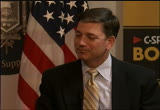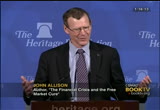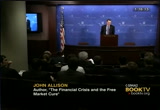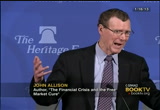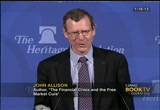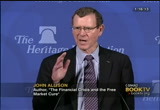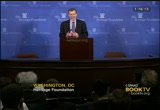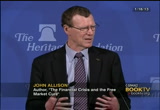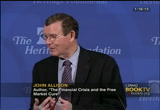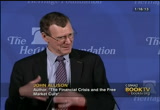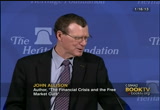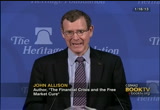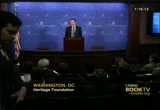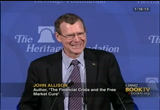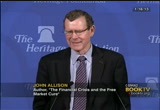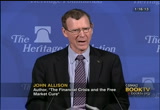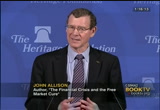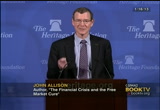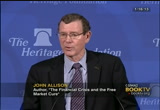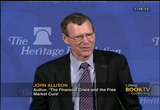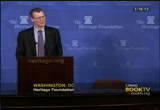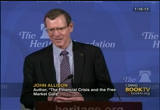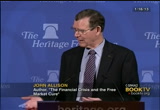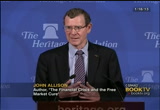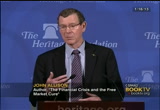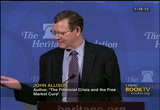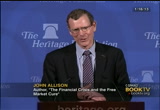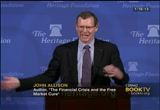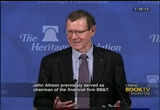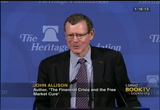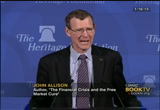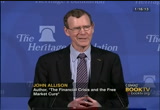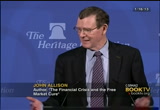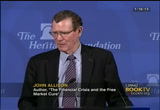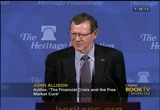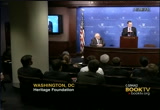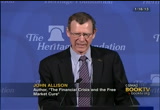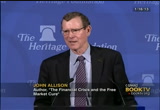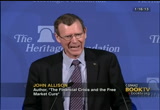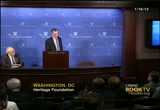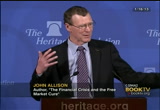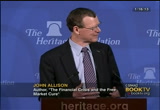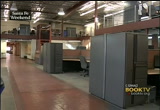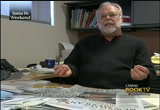tv Book TV CSPAN February 2, 2013 2:00pm-3:00pm EST
2:00 pm
>> host: here is the book. "the politics and security of the gulf: anglo-american hegemony and the shaping of a region". thank you for joining us, jeffrey macris. >> is there a nonfiction author or book you would like to see featured? send us an e-mail at the tv at c-span.org or tweak us at twitter.com/booktv. now on booktv, john allison argues that government incentives and regulation caused the 2008 claps and says that to improve the economy, we need to opt pure free-market policies. it is about 50 minutes. [applause] >> thank you. it is a pleasure to be here. i would like to congratulate heritage on the success that they have had. we did it.
2:01 pm
this is a pattern we have going forward and the purpose is to talk about my book, which is "the financial crisis and the free market cure." people ask me my i wrote the book. the basic answer is i thought it would be interesting to have somebody who knew what he was talking about write about thinking. because if you look to the academics to some degree, they don't know what they are talking about. [laughter] i think it's very important to undo a myth. these myths become destructive. the method they created is that it was caused by the deregulation on wall street. welcome to the simple fact is that this was not deregulated. we have the privacy act and we were mis-regulated, not
2:02 pm
deregulated. i have been working with wall street for 40 years and it's not like some grief swept out of the north. that is nothing new or different. in my book i talk about 16 us. first, government policy. we don't live in a free market in the united states. we live in a mixed economy. it is regulated by technology, will which has been done very well. the most regulated industry is financial services. that's not surprising. secondly, government policy created a massive mis-investment in the real estate market and that bubble burst as all bubbles do, destroying trillions of dollars of wealth. also, the institute of wall
2:03 pm
street is a serious mistake. the mistakes were secondary and in that context, it had an incentive in government policy. almost everything we have done since the financial crisis started since we have been in the short term. it would radically reduce our standard of living in the long-term. even though there is a lot of economic qualities, the real one is philosophical. finally, if we don't change direction economically, united states faces some serious long-term problems. we are doing some very bad things to her children and grandchildren. so what happened? well, we deal too much residential real estate.
2:04 pm
we go to investing in technology, we should have spent less and save more and borrowed a lot less from foreigners. the important thing that a lot of people do not do is housing is consumption. people usually think they invested in a house and it's an investment. it's not. if you overinvest in housing, what you're really doing is over consuming. so we have a massive overconsumption. in that process, which are millions of people how to do the wrong thing. we taught them how to build houses and be legal attorneys.
2:05 pm
in addition, if you drive up construction wages, you should drive up manufacturing wages. that drove millions of manufacturing jobs. the people in china did not know how to do that work very well. we are having a very difficult time giving those jobs back. markets never make a mistake of that magnitude. it takes government policy to create a mistake. in this case we did call the fdic and government housing and the fundamental context, the real problem is made by the federal reserve.
2:06 pm
some people don't get what it means. the monetary system of the united states was nationalized and there is no private monetary system. the government owns monetary system. if you're having problems in the monetary system, which is what this crisis is about, this is the definition of government policy problems. if interstate highway bridges were falling down, that is the governments problem. the government owns the monetary system that's what the federal reserve does. so was created in theory. in practice, what they do is increase problems in the long term in a free market. markets are constantly corrected. the failing process is actually as important as the creation
2:07 pm
process. this cannot be redirected and when you stop the downside correction all you do is create bigger problems in the future. you would be surprised if they had bad behavior and they keep the corrections from happening. in addition the only way the u.s. government can run its massive deficit is because the federal us have the -- the fedee has the ability to create money and that creates a huge temptation for politicians. with republicans and democrats. i don't believe we can deal with physical policy until we deal with monetary policy.
2:08 pm
in the early two thousands, the federal reserve had been here a long time. he's getting ready to retire, he wants to go out on a good note. interest rates are starting to be lowered and it creates negative interest rates. you can borrow at less than the inflation rate. right at the end of the term, greenspan realizes that he screwed up and the interest rates create an inverted yield curve. that's a natural and on and on. what it is means that short-term rates are higher than long-term rates.
2:09 pm
if you're going to make an investment, it is riskier. only the federal reserve can do that. banks make money and created and voted yield curves. the banking business is quirky. which means you can get higher interest rates and a backbone. so they went under this negative inverted interest rate. one reason that happen is at the same time ben bernanke was claiming that the federal reserve -- that there wouldn't be a recession. so it was a huge risk for them to take. in a certain fundamental sense,
2:10 pm
we couldn't have mathematically had this problem of where did the money come from if the federal reserve did not provide. second, it was the fdic that ensured this. it sounds like a good thing. competed with the number of community banks and took over one after it failed. it looked like a lot had failed. some guys have been in the hotel business, they got together, they started a bank, put in a little bit of capital and the leverage that by buying a deposit at very high interest rates. then they didn't care about the risk. the bank then took that money and took that to the cronies. so then they lost on the dollar. the bigger factor was a lot of
2:11 pm
these institutions failed. washington mutual, all of these using government insurance. there is no way market would've come in in this business about the government guaranteeing a positive insurance. the third factor, and i would call this a proximate cause is government housing policy. this goes back a long time. the government has tried to raise homeownership above market rate. well, the interesting fact is that owning a home does not influence human behavior, it's exactly the opposite. it is a saving self-discipline. and honestly encouraging people to buy homes they can't afford does not end well, as we can see.
2:12 pm
the government subsidy started with tax credit that people get from housing. then we started on a new path like the community reinvestment act, which forced banks to get into the low income high risk lending business and banks have no business being in that business because we are letting other people money. the banks should not be in a high-risk lending system. the really big event actually happened in september 1999. bill clinton who was president at the time made it mandatory, he said, okay, freddie mac and fannie mae. you have to have at least half your loans and affordable housing. that was a very dramatic announcement because of the size of fannie and freddie. an article in "the new york times" identified the
2:13 pm
involvement in this issue. freddie and fannie were so vague that there is no way they can meet this goal without reducing lending standards. so if they had achieved that goal, they would be taking so much risk and that could happen and they are so big that they could take out the whole u.s. financial system. nine years later, it happened. when they fail, they owed $5 trillion and they had $2 trillion in subprime mortgages. even before they failed, they were leverage 1000 to one. that means they had $8000 of that for every dollar. so the only way to do that is if the government guarantees your debts, not exactly what was going on. this is something that is way underestimated.
2:14 pm
you have the dominant player and has over half the market driving down lending standards. it sucks everyone into the hole. people go out of business and this was a government driven in for the whole industry under subprime lending. politics played a huge role. i was personally on the financial services roundtable and i was on that committee for about seven years. it was mathematically certain that fannie and freddie were going broke. we met with congress and the wonderful people and i thought barney frank was the one. the guy was so smart. the yet he would look at the facts. he had a religious belief and
2:15 pm
fannie and freddie were huge political contributors. so congress debated and they sucked the whole housing market down the tubes. fundamentally we had too much money and it ended up in the housing market. there are lots of other things like the whole issue of the derivatives market, which i do cover in my book and would be glad to talk about in the q&a. i would like to focus on something that i think is more important. i would like to focus on what i really believe caused the financial crisis. because it is a continuing problem. in the financial crisis was partially caused by philosophical ideas.
2:16 pm
a combination of all tourism and pragmatism. all tourism is not benevolence. all tourism is basically saying that everybody is more important than you. as interpreted, that means the collective is important than the individual doesn't matter. everybody has a right to a nice house. provided by who? everybody has that right to free medical care. divided by who? my right to free medical care is my right have a doctor provide me with medical care or have someone else pay for that doctor. you have the right to produce what you create. you don't have the right what someone else produces.
2:17 pm
the interesting thing about business is there is a backup philosophy and that's what we teach in our graduate business schools. here is the dilemma. lots of things work in the short term that are incredibly distressing in the long-term. subprime lending worked for years and then was an economic disaster. rationality demands a long-term perspective. you can't act on principle because pragmatism has no principle. people don't act on the principles. you have to just do what works.
2:18 pm
we are really facing that right now in the debates that we are having going on in our country. we have massive deficits in social security and medicare and everybody knows it. nobody seriously wants to do anything about it. and that leads to a lack of personal responsibility. the lack of personal responsibility is by far the central issue in a tidy in today's personal responsibility. are you responsible for yourself or are you entitled to what somebody else produced? that is the fundamental issue in our society. the founding fathers talked about the abuse of individual rights, which they really worried about. but they also realized that pretty soon the party was up to
2:19 pm
30% and they found 3% quit. just like the causes philosophical, so insecure. life and liberty and the pursuit of happiness. each individual has a right to express personal happiness. they have the right to the product of their labor. if you produce a law, you get a lot. if you think about that moral prerogative, it demands personal responsibility. it demands and rewards rationality and self-discipline. life and liberty and the pursuit of happiness. let's talk about the birdie for just a moment.
2:20 pm
you know defenders of liberty bigots and i think a i have. well, it is a nice thing to have. but it's a lot more important than that. liberty makes human progress possible. there is only one natural resource and that is the human mind. fifteen years ago [inaudible] fiber optics made out of this, saying someone is in dix, there is only one true natural resource. in order to be productive you have to be able to think for yourself. and pursue what you believe is true. if someone forces you to act and say that two plus two is five, you cannot think or contribute
2:21 pm
to human progress. you cannot have a business force you to act in a way. the wonder you can't be productive. all human progress is like this. creativity is only possible for independent thinkers. freedom is essential for human well-being. because man is a leading independent being. if you look at the life expectancy from whenever human beings evolved up to about 17501700, human rights advanced almost none.
2:22 pm
since the late 1700s until today, there has been a radical improvement in life expectancy across this entire planet. in the late 1700s, that was allowed to happen. the rule of law, the individual right, that was the human adventure that radically improved the quality of life. this is the a deal. being free is essential for human productivity. how about the pursuit of happiness? before the thinkers of the enlightenment, everyone else existed for someone else's good. jefferson said an interesting thing. each of us has a right to moral happiness. that was a world changing idea.
2:23 pm
creating the most accessible society in history. at the end of the day everyone is hating each other because they are all slaves to each other. here is an interesting thing about that idea. it is a very selfish idea. you are pursuing your own personal happiness. but it is selfish in the proper context that we sometimes forget. in the context of one pursuing rational self-interest properly understood. it's not about taking advantage of other people. pretty soon nobody is going to trust you and also if you go around, you let go of the truth and you do more damage to yourself. it's also not about
2:24 pm
self-sacrifice. the question i asked students to ask themselves, and i ask you to ask your children this question as well, you have as much right to your life as anyone does to their life? yes. you have as much right to your life as anybody else has had their life. of course. why would you believe anything different or not. pursuing irrational self-interest is not about taking advantage of other people. there's a moral code in regards to free society and free markets. it's about getting better to get it. life is about figuring out how to trade value for value.
2:25 pm
pretty soon it ends up being a losing situation. then you will get better. any relationship in your life that matters, you should ask what's in it for you and you should also ask what's in it for them. at the end of the day there is nothing in it for them if there's nothing in it for you. now of course you have to hold the context and acts what kind of world we would like to live in. so it's not taking advantage of others. it's about having a personal, purposeful, meaningful life. we cannot defend a free society.
2:26 pm
it is a fundamental philosophical issue and that is part of what was the founding fathers mission. when it comes to economics, sometimes the prediction is impossible. but i will give it to you anyway. i do think we are in a economic recovery and i think the people are conservative and they act like it, while that's possible that we can look like, you know, the boy crying wolf. we are probably going to have a slow economy. it will be way below what it should be. we are going to have stuck with higher unemployment and we should have an ill probably look like the 1970s.
2:27 pm
the compound difference is huge. setting up an environment for part of our growth which has to do with long-term consequences. i do worry about 10 or 20 years down the road. if we don't change and restore the principles that made america great, the numbers are staggering. the unfunded liability of the new obamacare has access to $100 trillion and that is a stunning number.
2:28 pm
we had a dysfunctional foreign policy, we had this problem of the baby boom generation. and we have a 12 from kindergarten education system. it is not too late. we have about that kind of timeframe in order to start moving. if we don't move soon, it becomes almost impossible to fix this without upheaval. i happen to actually be fairly
2:29 pm
optimistic. i do think two things. i think the american sense of life, americans fundamentally don't like big government. when times seem to be moving the wrong direction, sometimes we are surprised. i think this is a nice caviar. the biggest thing that we have going for us is that we have the best ideas. the bad news is that things have railed over and over again. people tell me how surprised they were when the soviet union failed. but communism always fails. it did not surprise me at all. the question is when it does,
2:30 pm
will we be there with the right ideas to move the country in the right direction. even though i think we will win because we have the right ideas. in regards to individual objects, i think we had problems economically and problems in deviations of politics. the company did great and never had a single quarter loss. we had some good strategies. but mostly we had the right kind of culture and ideas. we had a real sense of purpose and our employees wanted to do
2:31 pm
two things, make the world a better place to live and we can find that energy that people have without doing good work in the world, but doing it personally. secondly, we had high respect for rational decision-making and basing it on the facts. not invading the facts. being thoughtful and most importantly giving a clear sense of purpose. ..
2:32 pm
for everybody in this room and the vast majority of the people on this planet, the single biggest driver of self-esteem is your work because you spend a disproportionate amount of time, effort, and energy at work. that is what makes work important. that is why this issue about unemployment, and underemployment, is way more than economics. it is actually a very spiritual issue because work is spiritually important. i've said many times employee, you do your job well, it's far, far more important to give. you will never fool -- if you
2:33 pm
don't do your work the best you can do it, you will lower your self-esteem. if you're a college student, college isor work. if you don't do your work the best you can do it, you will lowerror self-esteem, if you make a good grade. the flip of that is true. if you do the work the best you can do, given your level of skill and knowledge. and you will raise your self-esteem and that's more about guy mow. it's about your character, fundamental human need. the interesting societal impolice indication -- implication ass of that, take a brake layer. a tough, hard, grinding job. but he and his wife are
2:34 pm
successful. they raise their children. me a his granddaughter becomes the ceo of a trading company. a hard-grinding life but very successful in that context. very interestingly, you get something very powerful from his work. he gets to be proud of himself. he gets to have self-esteem. take that same brake layer and give him welfare. he may be better off financially but he loses something incredibly important. he lose his pride and his self-esteem. you know, status of all political persuasions are really involved in this discussion of creating security. it's a false discussion but an interesting discussion. and while americans care about security, this is not the land of security. people didn't get on a boat and come to jamestown to be secure. the united states is the land of opportunity. opportunity to be great. opportunity to fail and try
2:35 pm
again. but most importantly, the opportunity of that brick layer to live life on his open terms. to pursue his personal happiness, given his beliefs and his values: that's why people came to the united states to pursue their personal happiness, given their beliefs and their values as free, independent people. and that american sense of life is what made our country so great and is what is so precious to defend. thank you very much. [applause] >> really terrific. always glad to hear another optimist in washington. you all have seen the book, i hope, outside. perhaps you have had a chance to read it already.
2:36 pm
i encourage you to do. so ate full of great insight. let's have a few questions. sir? >> i'm a consultant. often we move things further in the direction of having people do more things for themself as opposed to depending on the elements. >> i well-i had the -- i wish i had the answer for that. the reason i talk about philosophy, you look at what happened the united states, we philosophy include moved in the wrong direction, and public policy follows from ideas. so i think we ought to defend the ideas that made america great, including personal responsibility. and i don't mean we ignore community but you can't be entitled to what somebody else produces and creates and that's a very important idea. in the end, long term, most important thing we have to does recapture the educational system.
2:37 pm
the left took over the universities. when they took over the universities, they took over the elementary ed and on up base they teach the teachers, and we have to get that system back. we're having the wrong ideas, ideas in washington are -- the way to do that is to totally privatize education. we do that with vouchers and tax credits. that would create competition in education, and since our ideas are better, those ideas would win out if they can compete. so long term the biggest fight is over education system and really privatizing education, and it's interesting to me, minorities and low income people are huge victims of the educational system. it's not designed to deal effectively except for people that end up in college and that's not a very affective assistance. the fight in the short term we have to combine philosophical ideas, and we do need to impact
2:38 pm
point leaders across the spectrum by really world class research. because these ideas these, experiments have been tried and failed. so if we really do it right, we might not convince the people on the far left we're right, but we're going to convince them to be less confident in their ideas and less able to affect other people. so we have to preach the choir on philosophy, and to the ones too old to change their idea wes have to have world class research that refutes the consequences that they claim will come from their good policies. >> yes, ma'am? >> thank you so much for your remarks. you say americans fundmentally don't want big government. i worry that's not the case, but in any event, let's assume it
2:39 pm
is. why do we keep electing big government politicians? >> that a fair question. i don't know that americans don't want -- i thought that up until the last election and i was a little surprised. i still don't think they want that. when you ask them the question they say they don't, over and over they say -- it's a very high percentage -- they don't want government. but unfortunately a lot of people can't integrate what that means. they don't want the consequences of not having big government. what they want is a free lunch. they don't want too have to pay taxes and want all these benefits they that can't be caught paying taxes. so it's an intellectual disconnect and lack of integration, and that's the fundamental issue. that's where maybe the objective arguments are more important, where we show them this doesn't work and i particularly think
2:40 pm
we've got to show older people how bad it is for their children, and i don't think many grandmothers want to do bad thinks thinks for their grandchildren. and the stayed has done a good job of letting people rationalize that it's not true. an article in the new yorker said social security had no real problems and you have to know that anybody that writes is tase so detached from reality and they're reinforcing the life that people want to think there's no problem with social security mathematically. so how you do that and keep people inspired. it's easy to say i'm going to give you this stiff and -- stuff and you dent have to pay for it. everybody knows when your kids are 13, at it easy to let them get away with a lot of stuff and it's harder to be the
2:41 pm
disciplinarian, and usually one parent gets stuck with that job. right? my wife did that. that our challenge, how to make the discipline follow. >> just interested in your perspective as a -- from a policy and a former banking perspective on what should sort of happen with the gse issue right now, where we have this big government conserveship. hoe do we move on to a less government system without putting the economy into a tail spin. >> that's a good question. i was in the banking business when freddie mac and fanny may played no role and we did not have a problem. it was 20% down. you bent down to your local savings and loan and losses in housing finances were very
2:42 pm
small. the savings and loan industry was systematly destroyed by government policies. during the 60s 70s wanted the vietnam war and the social society but didn't want to tax people. so the that inflation, and loans have been financing houses at 8% fixed rates and suddenly they were paying 13% and the industry got wiped out. that's when fanny and freddie covered that gap. the private market for home finance is a market that developed overnight. here's the plan for freddie mac and 'fanny may. out for one year ask now they're closed and there will be market solutions and housing capital will be rielle located is recall. it's irrational to subsidize housing, which we're doing with
2:43 pm
these -- the reason freddie mac and grandmay dominate the market, what they're doing is economically rational. it if was rational, other people would dedoing it and fha is even nor economically irragga. if you want to subsidize ownership, do it with a cash payment. i'm opposed to that, but there's a certain integrity in that versus subsidizing all these institutions, freddie mac and fannie mae and fha, and the money goes to people not in the housing business. the biggest supporters of freddie mac and fannie mae are large investment banks who do this stuff. but announce they're closing down one you're from now, a private market would easily develop in that period of time and housing financing would be rational and we wouldn't be just investing in consumption.
2:44 pm
>> john, when we were speaking before your talk, you mentioned to me the extent of, for example, the feds' involvement in the micromanagement of -- just give us a couple of examples. it was so mind boggling. >> people do not realize how bad dodd-frank is, because it is invisible. i believe it's a very conscious effort to take over the financial system in the united states. if you want to control the country, control the allocation of capital, and the way to do it safely is do it in the back room. socialism doesn't work because everybody can see the government run businesses fail. but if you can blame somebody else when it doesn't work, then it's a great way to do it. through dodd-frank, credit allocation is in play. they haven't made any big moves yet but they're rolling them up. under the so-called consumer
2:45 pm
compliance, which is credit allocation, they can make you products, lime subprime lending, and your going to see subprime consumer lending happening. so the government can force -- they can also stop allocation. they do that -- they control the capital ratios for the banking business. before this crisis, a bank making a subprime, high-risk mortgage, had to have half as much capital as making the loan cost. increase subprime lending? if they want green energy, they can subdice dies green energy by saying green energy as a social purpose, therefore banks can pass the capital for green energy like they do for a dirty industry, whatever that means. so they set up a mechanism where they can control the allocation of capital in the united states, and when it blows up, everybody blames the bank. and the set this up -- this is
2:46 pm
intentional. >> community bank model does not work. and i think community banking is very important to our country. the regulatory cost structure is much worse for small institutions than big institutions, why is that? in big institutions you can hire other people to deal it. you're running a community bank -- i was there one day -- you got do it so instead of being able to think about things that are creative and productive, you have to think about making government bureaucrats happy. community banking is a bank going out of business after day there's been no innovation in the banking industry since dodd-frank. today, a at bbber t, we have to have the senate programs for our towers approved. i know that's hard to believe.
2:47 pm
because we might insult -- they have to be approved. so you have micromanagement of large financial institutions. what they're going to do -- i believe this is the intent -- consolidate the industry into 15 or 20 players and they can control it. they don't like all these messy community banks. they'll never say that but they don't like it. they want it very consolidated industry they can control. there's also the lehning standards are the worth in my 40 year career. why? they had this obsession we standardization. here's the problem with standardization. i grew up as a small business lender. it's totally a customized process. you have to judge people, are you going to pay me back or not? you can run numbers, but at the end of the day, a lot of the small business loans shouldn't be made based on the numbers. they're made based on this guy's got a great idea and somehow he is going to get it done you can't do that anymore.
2:48 pm
this is how these things have the -- it's unwhat they call unfair treatment. what do you have to do? you have to get a standardized process. and what does that mean? it has to be tighter standards. they tighten the lehning standards for small business more than any anytime my 40 year career. so small businesses, the huge job creators, actually don't have much access to capital markets today, and so many things can argue they didn't intend it. i don't know. if you want to control a company, control the banking business, the allocation of capital. >> last question from anyone? yes.
2:49 pm
>> back to the issue of people believing they don't need to rely on the government. i read recently some articles about the baby-boomers and what they have and have not saved for retirement. and it's such a stark contrast with the world war ii generation that were saves and didn't carry beams on credit cards, and now between different habits and then the recent financial hits, they're very unprepared, and so to me that is concerning because it creates a psyche of i don't want to sever the safety net because i might need it. i wonder from your banking days if you had seen a pretty strong change in that area. >> no question that my generation is way undersaved, and also that the savings -- i don't call it distribution -- relatively small percentage of
2:50 pm
people save. not just income. people just self-discipline have saved for their retirement. and then there's a lot of people at the other end of the spectrum that haven't saved. once they got misled in a way because they thought they're house was savings. when you create bubbles you due a lot of harm and damage to consumers. now their house is maybe worth less than they owe so they don't have savings and haven't developed the self-discipline for savings. i think that is a real economic challenge, and then, of course, what is bizarre, is right now we're doing everything we can to punish people that are saving in the banking business, we have lots of older people, older ladies who maybe their husband died and he and she together worked hard to put money in a bank account. they're in their 75, 80, and above, and they live on the
2:51 pm
interest from the savings, and ben bernanke is consciously holding interest rates below the market rate. he is stealing from the old people. he is punishing saves. and some of them go into riskier investments and at that age you tooth be living off the interest, and they probably could if the federal reserve wasn't artificially holding down interest rates. the biggest change from savers to people that will spendmake that will buy houses in the name of economic activity. didn't work out. why is that? people aren't stupid. they figured out that there's a huge disincentive to save and that something is wrong with this and it reduces their confidence. so, we're punishing the people that did the right thing, which is got, i think, ethical kole consequences. i don't think the federal reserve has the right to take
2:52 pm
money from older people and spend it for other people so they can boy a bigger house. and that's the thing wrong with government. >> again [applause] >> as president over the heritage foundation i want to say to you, as my colleague, president of the cato institute, not a word you said i disagree with. so thank you, ladies and gentlemen, of you have a copy of john's book and would like to have it signed, he will be doing that right up here, right now, and we are adjourned. thank you, john. [inaudible conversations] >> here's a look at upcoming back fairs and festivals around
2:54 pm
>> book tv recently explored the historical and literary culture of santa fe new mexico with the help of comcast. keep watching for more from the area. [inaudible conversations] >> i'm rob dean,ed did for of the santa fan, the daily newspaper that serves santa fe, new mexico, an institution that is 164 years old and we are in the offices of the santa fe new mexican. i'm also the editor of a book published in 2010 called santa fe.
2:55 pm
its 400th year, exploring the past, defining the future. the book had a humble beginning. it was not at first designed as a book. it began as a series of newspaper stories to commemorate the 400th anniversary of the founding of santa fe. in 1959, the publisher and editor of the new mexican had the presence of mind to ask a pulitzer winning novelist, oliver he far to write about santa fe's history as it emerged through the pages of the santa fe new mexican. he published a book called, secretary the, the autobiography of a southwestern town. at that time 110 years was news as reported in the santa fe new mexican. the books we published in 2010 served a a nice book end to that
2:56 pm
volume, with the same spirit. the 400 years of history of santa fe was the bedrock of this series of stories that became this book. what we identified through 400 years of history is these number of themes or trends or issues that have been constant currents through santa fe's history, is not a seemless narrative from -- seamless narrative from page one to the end. it's broken into 12 chapters so the timeline is full of all of these small events and big events to put the history of santa fe and its episodes in context. the intersection of cultures is one of the identifying features of santa fe. its long tradition of celebrating faith and
2:57 pm
establishing diverse faith communities is another theme. of course this is a political town. this is the capitol city and has been the seat of government since the founding 403 years ago. and so the exercise of political power and the development of public policy is another theme. the history of santa fe is distinctive. for one thing, santa fe became a u.s. territory in 1848. and it was a territory for a very long time. the country and washington were reluctant to make santa fe a state. that eventually happened in 1912. new mexico existed as a territory for so long, in someso many ways doesn't seem to fit the rest of the country. and in fact, santa fe proudly, for a long, long time, has described itself as the city
2:58 pm
different. santa fe was -- and new mexico were explored by the spanish, coming from the south to the north. not from anglos coming from the east to the west. that's one difference. this community that's closely tied to the catholic church, priests accompanied spanish settlers on their way north and establishment of the church and establishment of the community of santa fe are inseparable. of course, this is-was a spanish speaking territory. populated mostly by people of hispanic heritage. and there were questions from the east about what a new mexico and santa fe fit the definition of america. the flip side of that is there was a constant curiosity about whether santa fe and new mexico
2:59 pm
felt like they belonged and there were many episodes of resistance to federal rule in new mexico. what is going on today, this rich and diverse body of faith communities in santa fe, we constructed that on top of this foundation of faith being part of santa fe's history from the very start. santa fe has been the subject of many books by many writers, a diverse range of writers, and this book has a terrific bibliography for anyone who wants to read more about santa fe.
72 Views
IN COLLECTIONS
CSPAN2 Television Archive
Television Archive  Television Archive News Search Service
Television Archive News Search Service 
Uploaded by TV Archive on

 Live Music Archive
Live Music Archive Librivox Free Audio
Librivox Free Audio Metropolitan Museum
Metropolitan Museum Cleveland Museum of Art
Cleveland Museum of Art Internet Arcade
Internet Arcade Console Living Room
Console Living Room Books to Borrow
Books to Borrow Open Library
Open Library TV News
TV News Understanding 9/11
Understanding 9/11